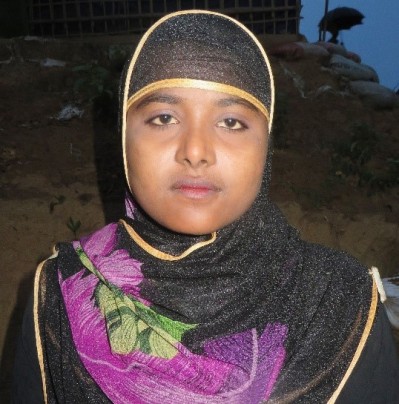Momtaz Begum was
startled at the topic of discussion at a group meeting in the Rohingya
camp. Never could she imagine that she would be learning about hygiene
practices in regards to menstruation, which is considered shameful by
the community she lived in.
Momtaz was attending a
focus group discussion conducted by Friendship as a part of the IOM
project: Humanitarian WASH assistance to Rohingya Refugee.
The project has been implemented to enhance the understanding of good
hygiene practices for the Rohingya, which is key in maintaining hygiene
and sanitation in the massive Rohingya camps.

Although initially
Momtaz was feeling too shy to participate, seeing other women sharing
their experiences encouraged her, and out of curiosity to know more, she
also joined in. She shared with them that every month she faced great
difficulties during her menstruation cycles. All her life she used
cotton cloth which she dried in secret, instead of using sanitary
napkins. During her period, when she used to feel too unwell to do her
household chores, her family used to scold her. She could never share
her difficulties with her husband as menstruation was deemed a taboo
topic. She even slept in a separate bed to avoid the supposed shame of
staining the bedsheets. Moreover, she used to avoid eating nutritious
foods in fear of heavy discharge during her periods, so as to be
inconspicuous about her condition.
At the group discussion,
she was greatly surprised to learn that there is no shame in
menstruation, as it is a natural monthly cycle for every girl and woman
up to the age of 45 or more. Instead, the health condition should be
shared with family members so that they can be understanding. For the
first time in her life, she learnt about the need to increase the intake
of water, nutritious food and maintain hygiene practices by changing
the sanitary napkin more than 4 to 5 times a day. The need to dispose
sanitary napkin in a designated place or pit was also highlighted, for
everyone’s health and safety.
“We
have never had such training about personal hygiene in Myanmar. We are
grateful to Friendship and IOM for providing us with such useful
information”, said Momtaz. Now Momtaz is eager to share her newfound
knowledge with other Rohingya women in the camp, so that they can also
benefit from it. Her knowledge, she feels, should be shared by all, but
not her shame. She believes that by relating her experiences to women
going through the same thing, she can diminish if not eliminate the
anxiety and health risks that she had to suffer through herself at one
time.
Youtube ► https://www.youtube.com/FriendshipNGO
Facebook ► https://facebook.com/friendshipngo
Twitter ► https://twitter.com/friendship_ngo
Instagram ► https://instagram.com/friendshipngo
Facebook ► https://facebook.com/friendshipngo
Twitter ► https://twitter.com/friendship_ngo
Instagram ► https://instagram.com/friendshipngo

No comments:
Post a Comment